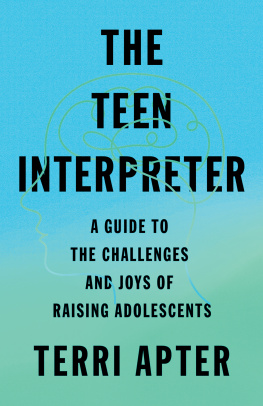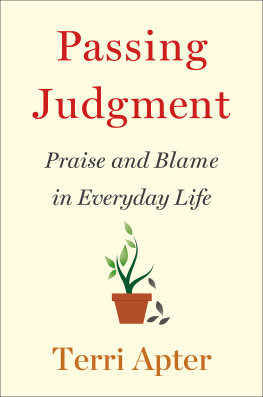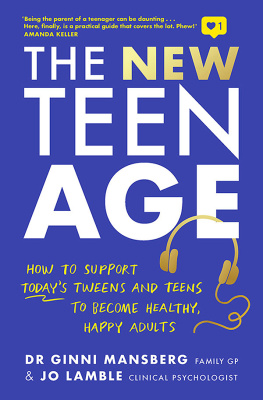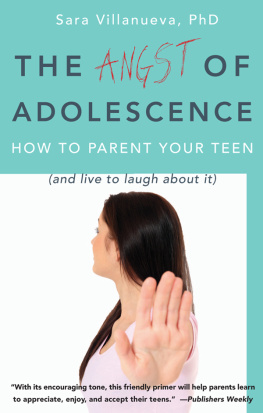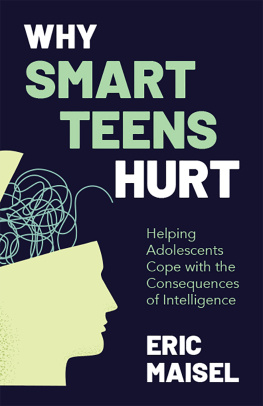
- 1
You dont know who I am (but I dont either).
Teens Alien Self - 2
I feel like my mind is exploding.
The Astonishing Teenage Brain - 3
You dont have any idea what I feel.
The Teens New Language of Emotions - 4
Only my friends understand me.
Are Parents Really Replaced by Teens Friends? - 5
I just did it. Stop asking me why.
Hot Zones and Pressure Points - 6
No ones ever felt this before!
Teen Love and Teen Sex - 7
You always say the wrong thing.
The Real Aim of Teen Criticism - 8
I dont think Ill get through this.
Vulnerability and Resilience - 9
I cant talk to you, but listen to my body.
Mind and Body Puzzles - 10
Youre not so perfect, either.
Parents Make Mistakes, Too - 11
Im grown up now (and its scary).
When Does Adolescence Really End?
THE
TEEN
INTERPRETER
THE
TEEN
INTERPRETER
A GUIDE TO THE
CHALLENGES AND JOYS OF
RAISING ADOLESCENTS
TERRI APTER

W.W. NORTON & COMPANY
Independent Publishers Since 1923
To Miranda and Julia
who introduced me to the joys and challenges of parenting teens
J UDY SITS in her kitchen relishing the mornings rare quiet moments. Today she doesnt have to be at work until noon, so there is no frantic clock watching. Noises coming from the bathroom assure her that her fourteen-year-old daughter Kirsty is awake. Today, at least, she will not have to shout, Time to get up. Today she will not be that parent who is always on her case as Kirsty says, nor endure the sound of her own stressed-out voice as she tells her daughter to get going.
Hearing the shuffle of Kirstys oversize slippers, Judy looks up from her phone. Her daughters tousled hair and sleepy face fill her with tenderness and joy. There is a distinctive adolescent edge, particularly in the sideways glance and grunt of greeting, but the adorable, adoring child is retained in the familiar features and luminous skin, delectable and kissable. A low chuckle emerges from her throat. Kirsty blinks twice, as though her mothers pleasure pains her.
Judy glances back to her phone. Her lips press together and she breathes in and out, deep and slow, resetting her positive mood. Breakfast? she suggests brightly. How bout some porridge today? Or toast?
Kirsty sighs, and for a moment, with a rucked forehead and tightening lips, she looks as though she might cry. Toast? she repeats. What a stupid... what a stupid suggestion.
Judy blanches and looks back at her phone. She concentrates on her messages. Kirsty turns away and mutters, soft but still audible, You are really stupid. For a moment there is silence, and for a moment both are still. Then Judy stands up briskly and says, Get your own breakfast.
I always get my own breakfast, Kirsty retorts. Her tears fall now, but she slaps them away with the palm of her hand, and then reaches for a paper towel. I want to get my own break-fast, she says as she blows her nose. This is almost an explanation, inching toward apology. And I never eat toast. After a beat she repeats, You know I never eat toast.
Fine, Judy retorts. Her light mood has been extinguished. She is hurt, angry, and fed up with this impossible teen.
You know I dont like talking when I just get up. Im not really awake. Kirsty is pleading with her mother to understand. But Judy does not hear this plea. She sees insult and rejection only. Fine, she repeats, unrelenting.
Fine, Kirsty mimics. The conciliatory voice is gone. She, too, feels rejected, and insulted.
You are impossible! Theres no point talking to you. Is there? Judy demands.
Youre impossible! And theres no point talking to you! Kirsty leans against the counter, her arms crossed against her chest. The tears still come, but there are no sobs. All you want, she begins but pauses to gain control of her breath, all you want is some sweet little kid. As Judy, face frozen, walks away, Kirsty calls out, You drive me nuts. As her mother leaves the room, Kirsty kicks a chair.
It is easy to respond to this scene (one of many I witnessed in the course of three decades observing teens and parents in their homes) with a familiar scoff, Teenagers! We know they are impossible, dont we? We know they are unreasonable. Today we even have evidence from neuroscience that teens brains are immature, with self-control and foresight lagging way behind their physical maturity. Teens are impulsive and reckless yet long to be free from the parental control they (on some level) know they need. So what else can parents expect beyond senseless outbursts, rudeness, and rebellion?
The aim of this book is to shift parents expectations of teens by presenting a new perspectivethe perspective of teens themselves. All too often adolescence is considered a phase parents must weather by standing firmly on their higher ground, resisting rather than sharing the teens perspective. Books on teens generally offer advice to parents about boundaries and control, along with analysis that reduces teens to hormonally driven neurotics. Adolescents forthright observations, their exquisite sensibilities, their joys and terrors in self-discovery are belittled, marginalized, ignored. The subsequent loss of focus and respect for teens inner world takes a heavy toll on teens and parents alike.
THE TEEN/PARENT DISRUPTION
Working with teens and parents as I have done over the past three decades is like watching a complicated interplay of passion, connection, and rejection. While filled with love, this dynamic sometimes feels very, very uncomfortable.
Many parents and teens experience a disruption in the rhythms of parent/child engagement. These rhythms begin in infancy with moment-by-moment interactionslooks, expressions, sounds, and gestures that last only seconds but are packed with meaning. These interactions may seem inconsequential, yet they are intricate, nuanced, and mutually coordinated. Each partner in this dynamicparent and childchanges the others inner world, adding to it, supporting it, challenging it, revising it, monitoring and validating it.
For the infant and then the child, a parents view of the world is the trusted one. The parent is the authority on what things mean, what actions are right, and what people are expected to feel. The parent contains and manages the infants own difficult emotions. Fear and frustration in a young child quickly reach storm levels. Screams and tantrums ensue, and a parent, often enough, calms these with soothing words and gestures, versions of There, there, its okay. A parent shows the child that he or she can survive emotional upheavals. There will be times, many times, when the parents own frustrations and anger are triggered by the childs, and both explode, but as long as a parent shows her power to contain the childs difficult emotions about 30 percent of the time, she offers a model of emotional regulationthe ability to manage intense emotions by learning that these go as well as come, and that the child can call on others for help in weathering lifes squalls.
In adolescence the microresponsiveness between parent and child is disrupted. A shift occurs away from the childs willingness to trust the parent either as a source of wisdom or as helpmate in emotional regulation. Many parents experience this shift as rejection; they tell me, My teen now thinks Im useless, and My teen doesnt care what I think, and even My teen hates me. Theres no love there anymore. These parents are in effect traumatized by the loss of a bond they value. That parental attunementthe special alert parents have to signs and signals in their childrengoes awry. Feeling threatened by loss of love, and by fear that they are unable to control their teencontrol the teen badly needsparents can become rigid and defensive. They are alert to signs of rejection and danger, but ignore signals of love and need.
Next page
